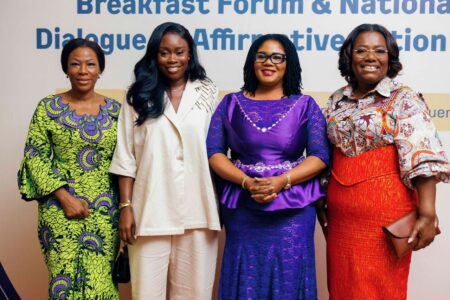On March 28, 2025, the Marriott Hotel in Accra became the epicenter of a crucial conversation on gender equity in Ghana. The 2025 Women’s Leadership Breakfast Forum , convened by Claudia Kwarteng Lumor, gathered female MPs, foreign ambassadors, and policy influencers to discuss a pressing question: Now that Ghana has passed the Affirmative Action Law, what next?
The passage of the Affirmative Action Act marks a historic moment in Ghana’s journey toward gender equality in leadership. But as several speakers at the event emphasized, passing a law is just the first step—implementation is the real test.
The Challenge of Moving Beyond Numbers
Ghana’s ambitious targets—30% representation of women in decision-making by 2026, 35% by 2028, and 50% by 2030 —are a bold commitment. However, history shows that laws alone do not guarantee change. Countries like Kenya and Nigeria, which have similar policies, still face structural barriers that keep women from truly influencing decision-making spaces.
Claudia Kwarteng Lumor, founder and CEO of Glitz Africa set the tone in her opening remarks:
“How do we ensure that women are not just present in leadership spaces but are also empowered to drive transformative change?”
The question underscores a persistent issue—representation does not always mean influence. Simply appointing more women to political and corporate positions does not dismantle the deep-rooted biases and power dynamics that often silence them.
A Law Decades in the Making
Nana Oye Bampoe, Ghana’s Deputy Chief of Staff and former Minister for Gender, Children, and Social Protection, reminded the audience that the struggle for affirmative action began long before this law was passed.
She traced its origins to 1996, when lawyer and women’s rights activist Gloria Ofori Boadu first proposed the idea. It took nearly three decades of lobbying, setbacks, and political negotiations before it became law.
“Thirty-three years later, we now have an act. It’s a moment for celebration, but also a moment for accountability,” she remarked.
Nana Oye Bampoe also highlighted the backlash women in leadership often face, citing the case of Nigerian Senator Natasha Akoti, who was suspended after speaking out on sexual harassment in parliament.
“Having the law does not mean the resistance disappears overnight,” she warned.
Enforcement: The Missing Piece?
Ghana’s Minister for Gender, Children, and Social Protection, Dr. Agnes Naa Momo Lartey, reassured attendees that the government is committed to enforcement.
She outlined plans for a Gender Equity Committee, responsible for monitoring compliance across ministries, departments, and agencies. The government is also finalizing a legislative instrument to guide the law’s implementation.
But policies often fail at the enforcement stage due to lack of funding, institutional resistance, and cultural pushback. Without consequences for non-compliance, will organizations and political parties take gender quotas seriously?
Beyond Government: The Role of Civil Society and the Private Sector
While much of the forum focused on government action, real change will require a shift across society—including the private sector, educational institutions, and cultural influencers.
A common critique of affirmative action laws is that they focus too heavily on politics while ignoring economic and social barriers. In Ghana, many women face financial limitations, workplace discrimination, and deeply ingrained cultural norms that prevent them from rising to leadership positions.
International representatives at the forum, including Harriet Thompson, (British High Commissioner to Ghana) and H.E. Simone Giger (Swiss Ambassador), emphasized the need for global partnerships in ensuring gender equity is not just a political checkbox but a societal transformation.
What Happens Next?
Claudia Kwarteng Lumor closed the summit with a powerful call to action:
“This dialogue must lead to action. We cannot afford to let this law remain words on paper. Together, we must build a Ghana where leadership reflects the true diversity of its people.”
But for that to happen, several critical questions remain unanswered:
Will the law include penalties for institutions that fail to meet gender targets?
How will Ghana address cultural resistance, particularly in rural areas where traditional gender roles remain strong?
What mechanisms will ensure that women in leadership are not just symbolic figures but active decision-makers?
The 2025 Women’s Leadership Breakfast Forum was an important step in keeping the conversation alive, but the real test will be whether Ghana moves from policy discussions to measurable impact.
The law is in place. The world is watching. Now, the real work begins

